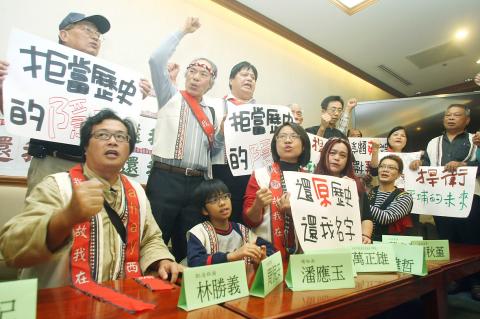|
Pingpu Aborigines decry ‘suppression’ of identities
RECOGNITION: Plains Aborigines demanded that they be identified as Pingpu Aborigines on official documents, and that their history be included in the new curriculum
By Lee I-chia / Staff reporter

Pingpu Aboriginal activists hold a press conference at the Legislative Yuan in Taipei yesterday to promote their demand for official status.
Photo: CNA
Pingpu Aboriginal rights activists yesterday urged the Ministry of the Interior to restore a voluntary annotation that shows their ethnic identity in household registration documents, and the Ministry of Education to recognize Pingpu Aboriginal tribes and their history in the newly revised school curriculum.
More than a dozen Pingpu Aborigines, accompanied by legislators and supporters, shouted: “Give back our history, return our names,” at a press conference at the Legislative Yuan yesterday.
Pingpu (平埔) is a general term used for Aboriginal tribes that inhabited the plains of western Taiwan and who were considered more “assimilated” than Aborigines who lived in mountainous areas or the east coast during the Japanese colonial rule.
Until the end of Japanese rule in 1945, the word shou (熟, used to denote “civilized” at the time) was used to mark the “ethnicity” of Pingpu Aborigines on their household registration documents, but the annotation was eliminated when household registration rules were changed.
Saying the deletion of the annotation shou on their household registration was meant to “write off” or “ignore” their ethnic identity, Pingpu Aboriginal rights activists have campaigned for years for the government to officially recognize their ethnic identity.
The activists said the former Tainan county government agreed in 2009 that the Siraya Pingpu Aborigines — a group living mainly in Greater Tainan, as well as parts of Chiayi County and Greater Kaohsiung — could register themselves as Pingpu.
In July last year, the Greater Tainan Government also allowed Pingpu Aborigines whose direct ancestors had shou in their household registration documents in the past to register for the same distinction on their household certificates. This was followed by similar measures in Greater Kaohsiung and Pingtung County, they said.
However, the interior ministry sent a letter to local governments in January asking them to withdraw the distinction.
The ministry’s action is a clear “suppression and violation of our basic human rights by denying even our slightest wish for recognition and self-identity,” they said.
Tainan Pepo Siraya Cultural Association chairwoman Uma Talavan said it is unfair that although the Pingpu were the first to be suppressed by outsiders who landed on the nation’s southwestern coasts and forced to adopt in part the Han culture, the Council of Indigenous Peoples is negating their identity by denying that they are Aborigines.
They also protested against the revised education curriculum for the 12-year compulsory national education program, saying that the Taiwanese history curriculum plans mention the Austronesian-speaking Aborigines in the 16th and 17th centuries, but the Pingpu groups are not included among the Aborigines in the textbooks.
“This is using the term Pingpu to teach students about the population in the earlier centuries, but refusing to tell the history of Pingpu groups,” Talavan said. “Taiwanese history without the history of Pingpu groups is not a true history of our nation.”
They demanded that both the education curriculum and household registration documents recognize that they are Aborigines.
An official from the education ministry’s K-12 Education Administration surnamed Tsai (蔡) said he would convey the activists’ opinions and petitions to the related agencies, and an official from the interior ministry said the ministry only stopped using the word shou on household registration documents in line with a decision by the Council of Indigenous Peoples.
source: Taipei Times
|